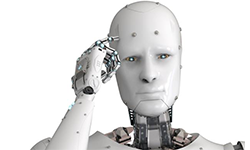Artificial Intelligence (AI) is upon us. (No, ChatGPT didn't write this.)
 I recently had my first encounter with AI. I was writing a website and the web designer
sent me several biographical paragraphs about company staff members. The paragraphs
were the product of Jasper, an artificial intelligence writing application.
I recently had my first encounter with AI. I was writing a website and the web designer
sent me several biographical paragraphs about company staff members. The paragraphs
were the product of Jasper, an artificial intelligence writing application.
She asked me to review the graphs and humanize them. Predictably they were informative but mechanical and devoid of emotion. I added some anecdotal facts about each person to bring them to life and softened some of the business rhetoric.
 My second encounter was on behalf of my 18-year-old granddaughter. I was helping her write an essay about Beloved, a book by Toni Morrison she read for her AP literature class. I decided to put ChatGPT
to the test and asked it to put together a 500-word essay focusing on the origins
of the main character Sethe and how those origins contributed to the story.
My second encounter was on behalf of my 18-year-old granddaughter. I was helping her write an essay about Beloved, a book by Toni Morrison she read for her AP literature class. I decided to put ChatGPT
to the test and asked it to put together a 500-word essay focusing on the origins
of the main character Sethe and how those origins contributed to the story.
I would use this as a guide in helping my granddaughter write her report. What came out in about 30 seconds was mind boggling: a perfectly structured essay with intro, supporting paragraphs and conclusion, with great details.
As before the copy was very informative, but sterile and devoid of human emotion.
Am I worried that AI is going to replace me as a writer? No. If I was going to make a living writing high school book reports or boiler plate work manuals I might be.
But much of what I write are human experiential stories full of emotion and sensory images, like some of the adaptive sports stories I’ve written.
 There was no AI on my river trip. Photo credit: Austen Diamond
There was no AI on my river trip. Photo credit: Austen Diamond
A good example is an article I wrote for the Utah Office of Tourism about an adaptive river trip I experienced with the National Ability Center. It’s doubtful that AI could generate specific stories about real people without a detailed prompt from a writer. Nor would it be able to report on the weather, temperature and other sensory qualities of the day. And unless I told AI how I felt in detail, it wouldn’t reflect who I am in an authentic way.
Renowned author, entrepreneur, and marketing guru Seth Godin, known for his innovative ideas and insights into the world of business and marketing says AI applications like ChatGPT are here to stay and they’re going to have a huge impact on how we communicate and create. As writers and creatives, we need to learn how it works and we should play with it. We can’t just dismiss it and ignore its impact on our world. He also maintains that we need to realize that AI is an illusion and a trick, and our brains are very susceptible to this kind of trick.
 Seth Godin has an Interesting Take on AI.
Seth Godin has an Interesting Take on AI.
For an interesting and provocative look at Seth Godin’s philosophy about business and how AI is going to affect our lives, check out this episode of Marie TV with host Marie Forleo.
The bottom line for me: AI is here to stay. It’s a great co-pilot and tool. But it requires a pilot like me to direct it. That is, unless it gets into mind control and starts telling me what to do. So far, only my wife can do that.
